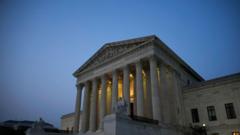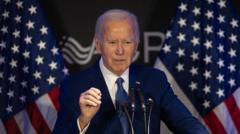The Supreme Court is currently reviewing the legality of President Trump's executive order aimed at ending birthright citizenship for children of undocumented immigrants, a move that could significantly influence immigration policy in the US.
Trump’s Birthright Citizenship Order Faces Supreme Court Scrutiny

Trump’s Birthright Citizenship Order Faces Supreme Court Scrutiny
US Supreme Court reviews Trump’s attempt to revoke birthright citizenship amidst legal challenges.
In a notable case spotlighting ongoing tensions between the executive and judicial branches, the Supreme Court is hearing arguments regarding President Trump’s order to eliminate birthright citizenship for children born in the US to undocumented parents. The order, swiftly enacted upon his return to the White House in January, was met with immediate obstruction from three federal judges who issued nationwide injunctions to halt its enforcement, asserting that they had jurisdiction to do so.
Central to the case is the interpretation of the 14th Amendment, which currently guarantees citizenship to “all persons born or naturalized in the United States.” Trump’s administration argues that the language pertaining to “jurisdiction” implies that children of undocumented immigrants do not qualify for automatic citizenship. If the Supreme Court sides with Trump, it could embolden his capacity to utilize executive orders for implementing policy without congressional oversight, igniting further legal disputes.
The case arises from multiple lawsuits filed by immigration advocates and states opposing the order, prompting the Trump administration to seek a ruling that limits the scope of injunctions to only the affected parties. Legal experts warn that an alteration of birthright citizenship could render thousands of US-born children stateless, as their home countries might refuse to accept them if deported. Legal implications surrounding this case are profound, as it probes the limitations of presidential power and the rights enshrined in the Constitution.
The Court’s decision-making timeframe remains uncertain, but a ruling in favor of the administration could transform United States immigration policy significantly, navigating complex questions of constitutional law and individual rights.
Central to the case is the interpretation of the 14th Amendment, which currently guarantees citizenship to “all persons born or naturalized in the United States.” Trump’s administration argues that the language pertaining to “jurisdiction” implies that children of undocumented immigrants do not qualify for automatic citizenship. If the Supreme Court sides with Trump, it could embolden his capacity to utilize executive orders for implementing policy without congressional oversight, igniting further legal disputes.
The case arises from multiple lawsuits filed by immigration advocates and states opposing the order, prompting the Trump administration to seek a ruling that limits the scope of injunctions to only the affected parties. Legal experts warn that an alteration of birthright citizenship could render thousands of US-born children stateless, as their home countries might refuse to accept them if deported. Legal implications surrounding this case are profound, as it probes the limitations of presidential power and the rights enshrined in the Constitution.
The Court’s decision-making timeframe remains uncertain, but a ruling in favor of the administration could transform United States immigration policy significantly, navigating complex questions of constitutional law and individual rights.




















